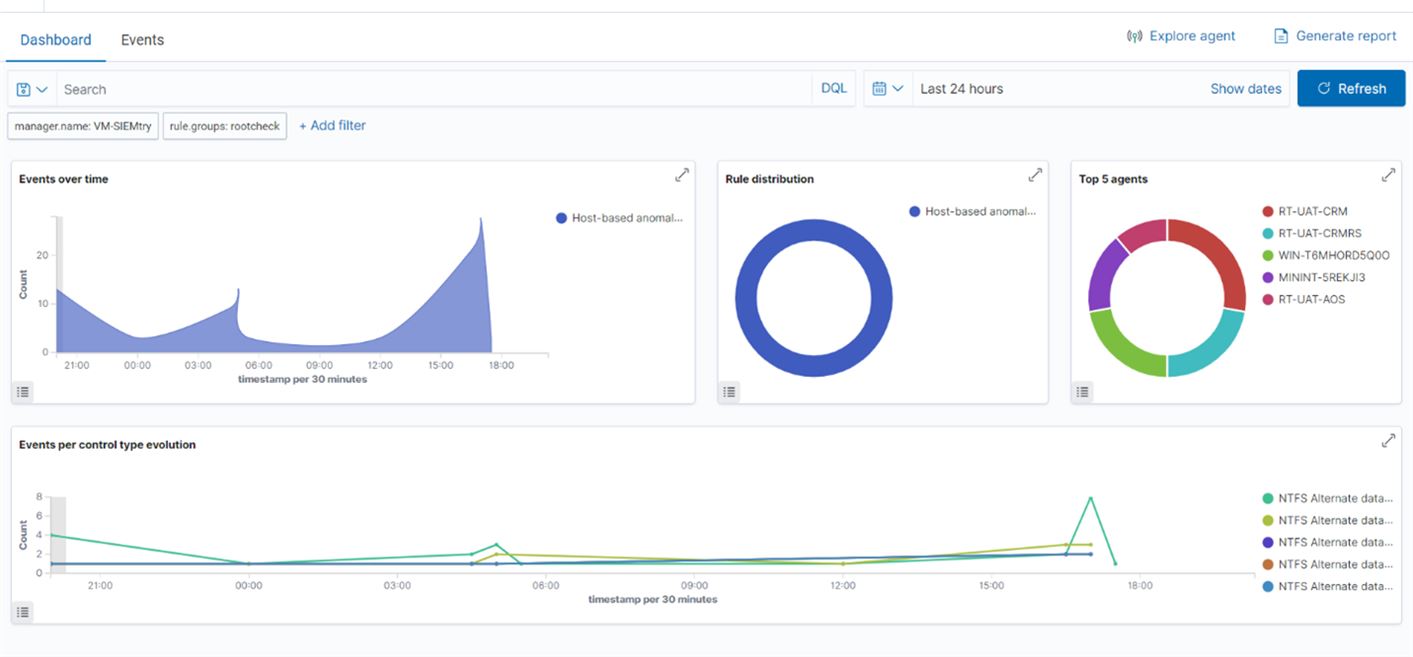Rootkit Detection
Amygdala XDR®’s rootkit detection module provides a way to detect and respond to rootkits, which are stealthy malware that can hide their presence on a compromised system. The module is designed to identify any unauthorized changes to the system that might indicate the presence of a rootkit. Amygdala XDR®’s rootkit detection module uses a variety of techniques to detect rootkits, including file integrity monitoring, process monitoring, and kernel module monitoring. It can detect changes to critical system files, the creation of new processes, and the loading of unauthorized kernel modules.
In addition to detecting rootkits, Amygdala XDR®’s rootkit detection module can also take actions to respond to rootkits, such as alerting security teams, blocking network traffic, or quarantining affected systems. The module is highly customizable and can be tailored to the specific needs of an organization. It can be configured to monitor specific files, directories, and processes, and to trigger alerts based on specific events or thresholds.

Technical Description
Amygdala XDR®’s rootkit detection module uses a combination of techniques to detect and respond to rootkits, which are stealthy malware that can hide their presence on a compromised system. The module includes file integrity monitoring, which detects changes to critical system files that may be indicative of a rootkit. It also includes process monitoring, which detects the creation of new processes that may be associated with a rootkit. Additionally, kernel module monitoring is included to detect the loading of unauthorized kernel modules that may be associated with a rootkit.
Amygdala XDR®’s rootkit detection module leverages your system-level APIs and kernel modules to monitor system activity and detect signs of a rootkit. It uses the Open-Source Security Information Management (OSSIM) framework for event correlation and analysis, allowing it to generate alerts and notifications based on specific criteria.
Features
Early Detection of Rootkits
Amygdala XDR'®s rootkit detection module detects rootkits early before they have a chance to cause serious damage to a system or network. This can help organizations respond quickly and minimize the impact of an attack.
Multi-platform Support
Amygdala XDR®'s rootkit detection module supports a wide range of operating systems, including Windows, Linux, macOS, and others. This makes it a flexible and versatile solution for organizations with diverse IT environments.
File Integrity Monitoring
Amygdala XDR®'s rootkit detection module includes file integrity monitoring, which can detect changes to critical system files that may be indicative of a rootkit. This can help organizations identify suspicious activity and take action to investigate and remediate potential threats.
Technology-Supported, Protocols
Amygdala XDR®’s rootkit detection module does not rely on any specific network protocols, as it primarily focuses on monitoring system-level activity rather than network traffic. It monitors system files, processes, and kernel modules to detect signs of a rootkit, and can generate alerts and notifications based on specific criteria. While the module can be integrated with a wide range of SIEM solutions and other security tools, it does not use any specific protocols of its own.
Amygdala XDR®’s rootkit detection module uses a variety of system-level APIs and kernel modules to monitor system activity and detect signs of a rootkit. It leverages a range of open-source technologies, including the Open-Source Security Information Management (OSSIM) framework for event correlation and analysis.
Module Dependency
Amygdala XDR®’s rootkit detection module uses a variety of open-source libraries and projects to help identify and respond to rootkits. Some of the key libraries and projects that the module depends on include:
System calls and kernel modules
Amygdala XDR®'s rootkit detection f module uses a range of system calls and kernel modules to monitor system activity and detect signs of a rootkit. These low-level tools provide a granular view of system behavior, enabling the module to identify even subtle indications of a rootkit.
Machine learning algorithms
Amygdala XDR®'s rootkit detection module incorporates machine learning algorithms to enhance its detection capabilities. These algorithms use historical data to identify patterns and anomalies that may indicate the presence of a rootkit.
Open-Source Security Information Management (OSSIM)
Amygdala XDR®'s rootkit detection module is built on the OSSIM framework, which provides a scalable, centralized platform for managing security information. OSSIM enables the module to collect and correlate data from multiple sources, enhancing its ability to detect rootkits. File Integrity Checking (FIM) tools: Amygdala XDR®'s rootkit detection module uses FIM tools to monitor changes to critical system files and directories. By comparing the current state of a file to a known baseline, the module can detect if a file has been modified or replaced by a rootkit.

Redefining IT Performance and Security Through Intelligent Innovation.
